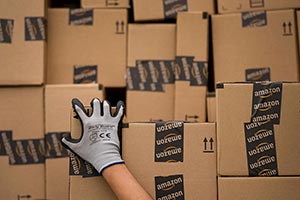Amazon Expands Logistics Reach With Move Into Ocean Shipping

Amazon.com Inc.'s China arm has registered as an ocean freight forwarder, according to the U.S. Federal Maritime Commission, a move that will give it more control over shipping products from Chinese factories to U.S. shoppers.
The registration is the latest indication that Amazon plans to expand its logistics reach to cut costs for its retail business and potentially provide third-party logistics services to other industries.
Its new status as a freight forwarder, or "non-vessel operating common carrier," gives Amazon, the world's largest online retailer, a foothold in the $350 billion-a-year ocean freight business. It will not operate ships but subcontract that work.
Amazon already is negotiating a deal to lease 20 jets to start an air-delivery service in the United States, the Seattle Times reported last year. The retailer bought truck trailers to add shipping capacity and started a program last year that uses a fleet of on-demand drivers to deliver packages.
"It has more and more control over the supply chain of their business, and it gives them the ability to squeeze [costs] even further," said Satish Jindel, a logistics consultant and president of SJ Consulting Group.
He added the move gives Amazon an even bigger edge against traditional U.S. retailers in negotiating lower prices for goods.
FMC, a U.S. government agency that regulates the U.S.-international ocean transportation system, said Jan. 14 a business named Beijing Century Joyo Courier Service Co., with the trade names Amazon China, Amazon.CN and Amazon Global Logistics China, was registered in its database to provide ocean freight services.
Amazon China submitted its registration request Nov. 9, the commission said Jan. 14, and it was reviewed and registered Nov. 13. It is the entity's first registration.
"Amazon's ocean freight services will be far more attractive to Chinese sellers than to American buyers. Chinese suppliers would love direct access to Amazon's vast American customer base," wrote Ryan Petersen, CEO of San Francisco-based freight forwarder Flexport, He first wrote about Amazon's registration on his company blog Jan. 14.
Petersen added that Amazon's third-party merchants were unlikely to use its shipping service because it would expose key data such as wholesale pricing and supplier names to a rival.
An Amazon spokeswoman declined to comment.

